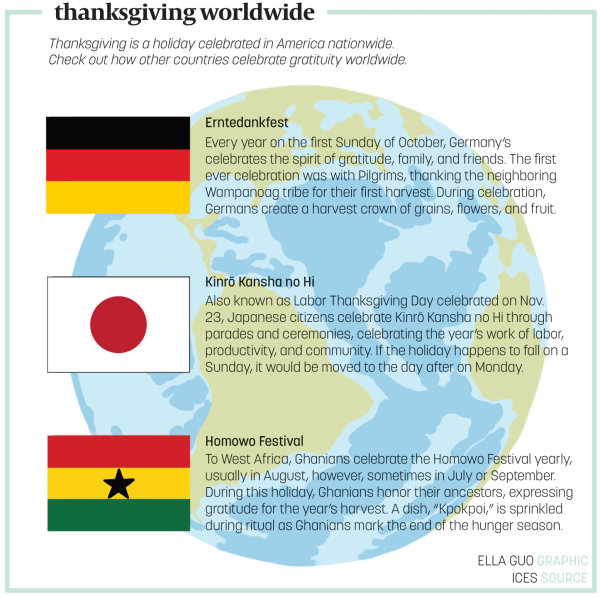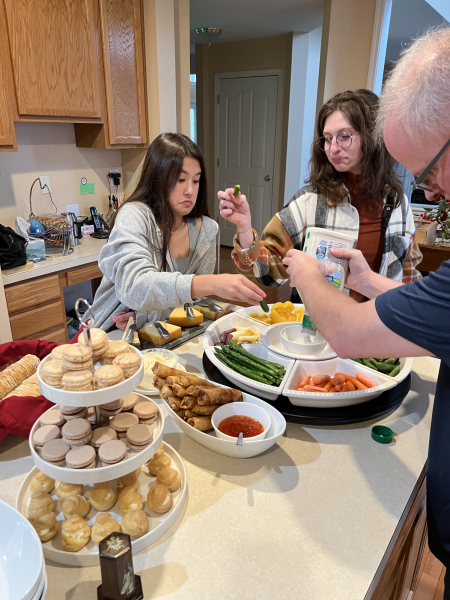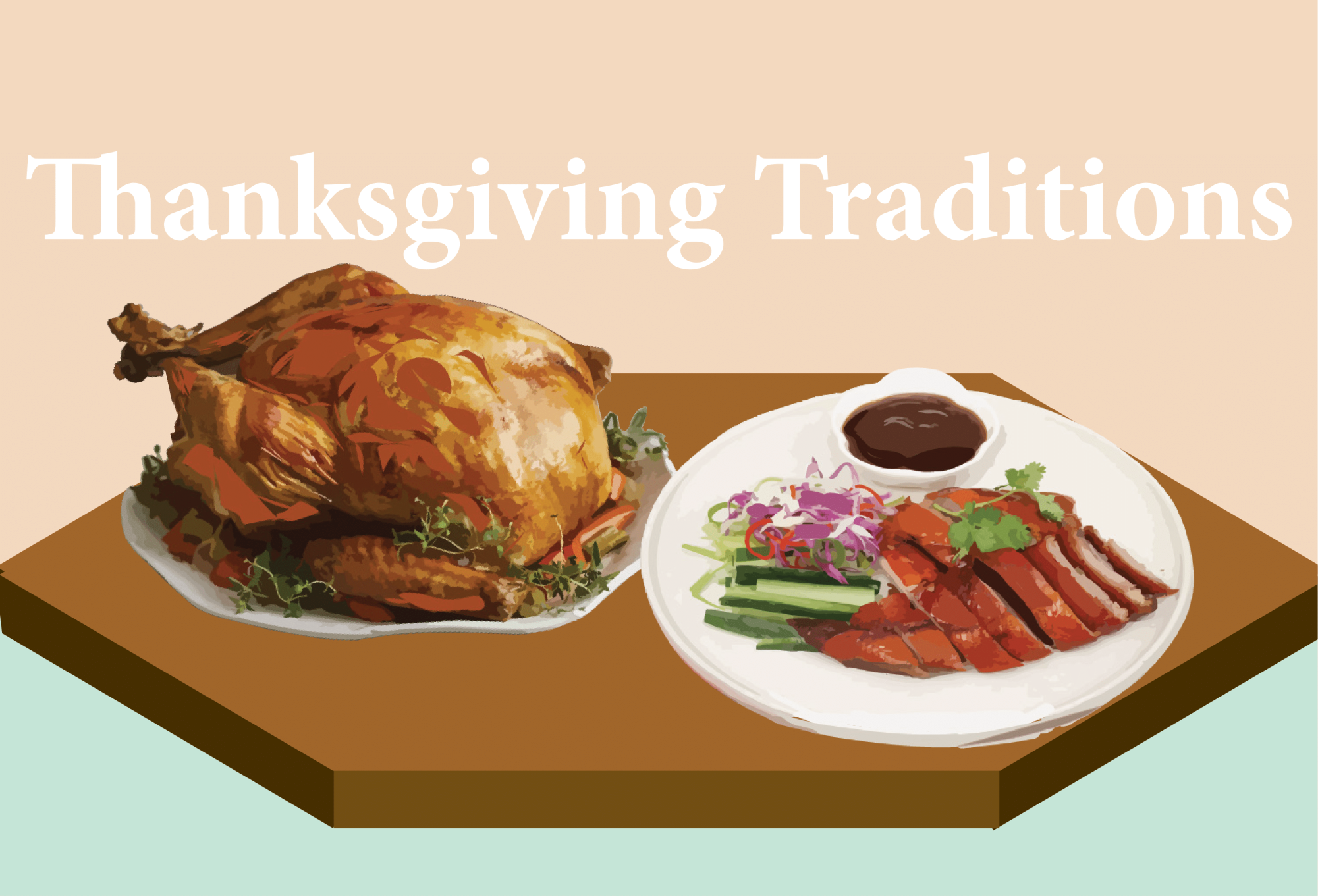As the fourth Thursday of November approaches—this year, it will be Nov. 28—the perfect American Thanksgiving comes back into the spotlight. As a holiday that originated from an autumn harvest feast between the Plymouth colonists and Native Americans, Thanksgiving holds distinctly American roots that, in turn, has inspired American traditions. The stereotypical Thanksgiving conjures images of meeting extended family, playing football, and enjoying a feast of cranberry sauce, potatoes, stuffing, pumpkin pie and most importantly, turkey. However, with 40% of Americans being immigrants or citizens with different ethnic backgrounds who may not celebrate a traditional American Thanksgiving, a question emerges for ethnically and racially diverse families: how do these mixed families balance different ethnic traditions with the perfect American Thanksgiving?
Importance of Thanksgiving
Junior Kaia Starnino said she has been struggling to answer this question for a long time. Before sharing how she and her family were able to find a solution, Starnino said she wanted to share the importance of Thanksgiving for her family.
“In my family, Thanksgiving is one of our most celebrated holidays,” Starnino said. “We usually go to Chicago every year to see my aunt and uncle and cousins, where we all celebrate with a Thanksgiving dinner. It is an important part of the year, because it gives us an opportunity to visit our relatives and spend time with family while eating good food. Celebrating Thanksgiving allows us to see family and celebrate with them in ways that we usually wouldn’t. By cooking and sharing a meal with people, I think that you have an opportunity to talk and bond with them that wouldn’t usually arise otherwise.”
Junior Andrew Fechtman said he agreed with Starnino and said the family aspect of Thanksgiving is critical.
“Thanksgiving has always been a very important holiday to our family,” Fechtman said. “It’s another excuse for all of us to meet up and spend time with each other. My siblings always come home to celebrate with us and I see a lot of family members that I don’t get the chance to hang out with often. Being able to spend quality time with my entire family (is a benefit). With school, extracurriculars, and sports, I don’t get the chance to hang around with my family too often. Thanksgiving is made so much more enjoyable because I get to enjoy it with everyone.”

However, Thanksgiving is still often overshadowed by other holidays that are also coming up, like Christmas. Senior Lukas Krishnamoorthy said he agreed with this sentiment and said this was due to his ethnic background and restrictions on seeing his family.
“I would say Thanksgiving is a bit less important than some other holidays in my family,” Krishnamoorthy said. “We probably celebrate Christmas and Easter more, maybe even Halloween when I was younger. My dad’s side isn’t from America, so I don’t think it has much significance to him. My mom is from (America), but all of her family is kind of like six or seven hours away, so I think it just doesn’t have that much importance because I would never be celebrating Thanksgiving with at least half of my family. I have never visited my Indian side of my family for Thanksgiving. I would say the American side of my family celebrates it much more.”
World language teacher Fernando Yanez said he agreed with Krishnamoorthy and for him, the American side of his family places a larger emphasis on Thanksgiving.
“It’s a big deal with the American side of my family,” Yanez said. “It’s probably between Easter and Christmas, Christmas is the much bigger holiday in my family. None of my Spanish relatives have moved to the United States, so I don’t celebrate Thanksgiving with them. They have come to visit multiple times, and even once during Thanksgiving. They came one year and we just did an American Thanksgiving (and) traditional dinner with them. Thanksgiving does not exist at all in Spain.”
Ethnic versus American Traditions

Starnino said she has been struggling to answer this question for a long time. Starnino said she recalled two distinct ways she celebrates Thanksgiving due to the ethnic diversity in her family.
“The first was a traditional Thanksgiving dinner, cooked by my family, with foods like turkey, stuffing, mac and cheese, mashed potatoes, cranberry sauce, et cetera,” Starnino said. “The second was more nontraditional, where we would go to a restaurant and get seafood. I particularly remember always eating crab for Thanksgiving, in which the idea came from my mom and her sister, my aunt, who created the tradition upon arriving in the United States as immigrants.”
Starnino said her Thanksgiving is atypical of the stereotypical American Thanksgiving thanks to her diverse background. Neither of her parents were born in the United States, and Starnino possesses Scottish, Italian, and Indonesian roots.
“Because both of my parents are immigrants, we didn’t always celebrate Thanksgiving in the typical, traditional way,” Starnino said. “Although Thanksgiving is traditionally an American holiday, it is celebrated in Canada, where my dad is from, on a different day. Even in Canada, my dad had a diverse ethnic background; his dad was half-Scottish and half-Italian, and his mom was half-Irish and half-British, so he also celebrated Thanksgiving surrounded by a blend of cultures throughout his life. However, his way of celebrating Thanksgiving was still similar to the traditional American way, which was drastically different from my mom’s traditions. My mom, being from Indonesia, had little experience in celebrating Thanksgiving. For her, it is less of a tradition and more of an opportunity to eat food with family and friends and give thanks for the good things in her life.”
Fechtman said his family also incorporated differing cultural aspects into their Thanksgiving celebrations.
“I am half Vietnamese and I’m unsure about my other half,” Fechtman said. “My dad is adopted and the other side of my ethnicity has been a mystery to all of us. Throughout the years, I’ve always called my dad’s side of the family my true family, regardless of (whether) we share blood or DNA. Since my Vietnamese side of the family still lives in Vietnam, Thanksgiving is a time to be with my dad’s side. Although my mom’s side of the family cannot be present at the table, their cultural influence still spreads to our Thanksgiving experience every year. My mom has always prepared the prototypical Thanksgiving dishes such as turkey, ham, mashed potatoes, et cetera. In addition to these dishes, my mom has always prepared spring rolls with them. It’s her way of sharing our culture with my dad’s side of our family.”

However, Krishnamoorthy represents a different set of circumstances. Krishnamoorthy said his family, although ethnically diverse, sticks to the traditional American way of celebrating the holiday.
“I wouldn’t say my Thanksgiving is really a mix of cultures,” Krishnamoorthy said. “It feels like a normal American Thanksgiving, but watered down because it has less importance. We don’t really do anything with Indian traditions or eat Indian food during Thanksgiving, especially when I visit my grandparents. If I were to celebrate with the Indian side of the family, they might eat Indian food but I don’t really know how they celebrate Thanksgiving.”
Finding Compromises
Although Thanksgiving may result in cultural conflict in ethnically diverse families, Starnino said her family was able to find a solution.
“We celebrate Thanksgiving in two different ways; eating out at a seafood restaurant, usually an Asian restaurant, which is an idea coming from my mom, and a traditional Thanksgiving dinner, which comes from my dad,” Starnino said. “We typically cook and eat dinner on the day of Thanksgiving and go out to eat at the restaurant either the day before or after. I think that this balance represents my diverse ethnic background perfectly and mixes tradition with a new aspect.”
Starnino said there was a key emphasis on compromise.
“I think that a difficulty we faced in trying to balance the different attitudes towards Thanksgiving traditions in my family was finding a compromise,” Starnino said. “My mom didn’t previously celebrate Thanksgiving, and didn’t really understand the purpose of the holiday at first. In contrast, my dad was a strong advocate of celebrating it traditionally, the way he and his family did. I think that the most significant challenge we faced regarding Thanksgiving was figuring out the balance between the two traditions. But over time, as more was learned about tradition, opinions and taste, we came up with a compromise that allowed us to experience tradition while also ensuring everyone’s happiness, which is crucial to the spirit of the holiday.”
On the other hand, Fechtman said his family didn’t have difficulties in finding a way to represent everyone.
“My family hasn’t faced many issues in finding a way to successfully celebrate Thanksgiving together,” Fechtman said. “Both sides of my family have been fully accepting of each other. My dad’s side loves the Vietnamese touch to our Thanksgiving experience and my mom loves being able to celebrate the American holiday with everyone.”
Benefits to a Hybrid Ethnic-American Thanksgiving
Fechtman said there were various benefits to having an ethnically diverse Thanksgiving.
“I think that there are a lot of benefits to our differing Thanksgiving traditions,” Fechtman said. “My immigrant mother gets to fully experience an American holiday with an inclusive family. On the other end, my dad’s side of the family gets to experience a small piece of Vietnamese culture along with a classic holiday that has always meant a lot to them.”
While Starnino and Fechtman both have different Thanksgiving traditions and experiences, both agree that they love the way their families celebrate the holiday.
Fechtman said, “There is nothing I would change about the way I celebrate Thanksgiving with my family. I’m fully content with our traditions and I look forward to the holiday every year.”
Starnino said, “I wouldn’t change a thing about my family because I love them and I believe that it is so important to stay true to your identity, which is evident in my Thanksgiving traditions.”



